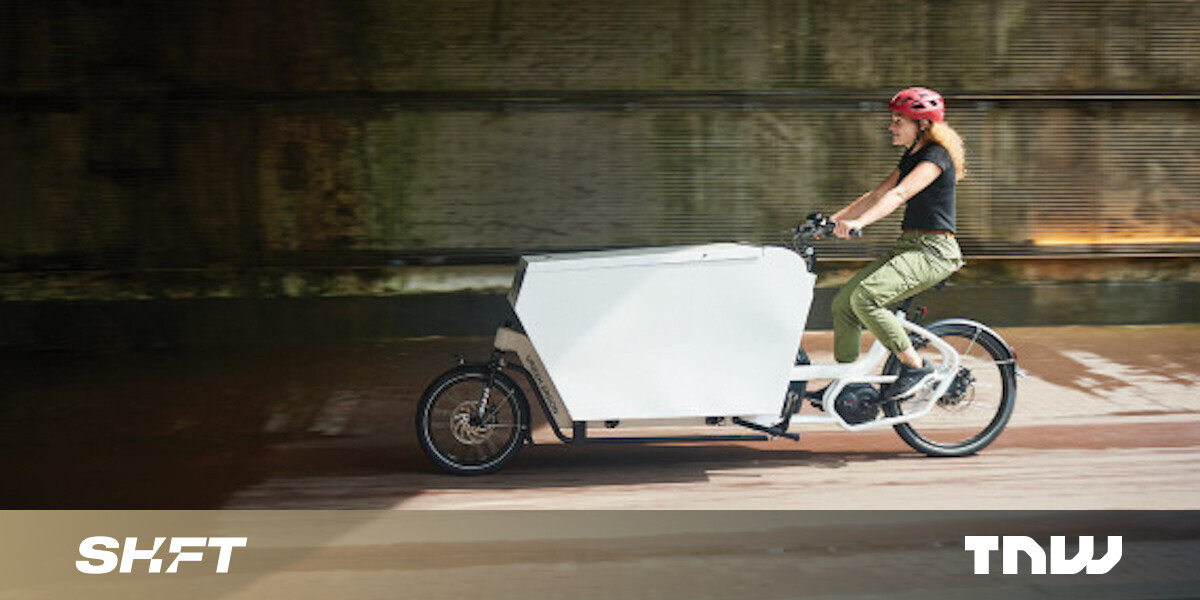
This article was written by Frank Oudegeest on The Urban Mobility Daily, the content site of the Urban Mobility Company, a Paris-based company which is moving the business of mobility forward through physical and virtual events and services. Join their community of 10K+ global mobility professionals by signing up for theUrban Mobility Weekly newsletter. Read the original articlehere and follow them onLinkedin andTwitter.
The Business of Mobility is an Urban Mobility Company series highlighting some of the most successful new businesses in the mobility sector. Featuring a closer look at the way in which companies stand out, CEOs, Directors, and other c-level executives elaborate on what it takes to turn a great idea into a great company.
Frank Oudegeest, Director of Urban Arrow B2B, explains how Urban Arrow is turning cargo bikes into a viable alternative to the delivery van.
My crush on bikes
I began my career in the automotive business and worked there for 18 years, serving brands like BMW, Volvo, and Renault. But I became fed up with the car industry and wanted to work in a more sustainable aspect of the mobility game. I’ve always had a crush on bikes, so when the opportunity arose I left the car industry and eventually landed up at Urban Arrow. I started in the business setting up and training dealers, particularly in the Netherlands and Belgium. I was fortunate to join during a time of growth and currently we have 600 dealers in 20 countries.
The spirit of freedom
The Dutch are famous for their love of cycling; there’s a spirit of freedom and egalitarianism about the bike which chimes with our national character and with our attitude at Urban Arrow. It’s a great place to work. Urban Arrow has a flat management structure and employees are motivated by their passion for cycling, for interesting design, and for the promise that new mobility will make our cities more livable and reduce carbon emissions.
Organizations that empower their employees are more likely to lead on innovation. One of Urban Arrow’s key contributions in this regard is the modular design: all our bikes have the same rear frame that can be connected to a different front frame. For example, you can start with a family bike that you put your kids in and then change the front part to a cargo version, of which there are various designs.
B2B Opportunity
It’s great to have success in the family market but the real opportunity for cargo bikes to change our cities will come in our contribution to resolving last-mile deliveries.
In 2019 Dutch transport conglomerate, Pon, bought Urban Arrow to expand their bike portfolio, which includes Gazelle, Cervélo, FOCUS, Santa Cruz, and Kalkhoff. The injection of capital and expertise presented us with the opportunity to restructure. We split Urban Arrow into two distinct divisions, family and B2B. I became director of B2B, focusing on direct sales to larger companies and developing new bikes for last-mile delivery in cities.
Transitioning away from car ownership
Whereas our family customers tend to average around 30 kms a week, our business clients average 300-500 kms per week. There’s lots to go wrong when you’re carrying loads of up to 400 kgs for hundreds of kilometers each week.
Fortunately, the ebike industry has advanced to a level where the engine and battery technology is solid and consistent. Urban Arrow is well served by Bosch motors, which come with excellent warranties and international service support.
The real service and maintenance challenge is in the mechanical parts. A bike has dozens of parts: brakes, sprockets, steering rod, chain, fenders, tires, hubs, cranks etc. The next major shift in the ebike industry will come from service improvements that minimize downtime, ensure predictability, reduce overall cost to ownership, and thus win the business case for transitioning away from car ownership.
How can IoT resolve servicing and maintenance issues?
We’re working closely with Pon IT to develop our IoT capability. Smart data and IoT is changing the world and a company like ours cannot afford to be left behind. Our aim is to build a system that delivers predictive and proactive maintenance for customers.
I foresee a time when we deliver the same seamless mobility experience which the auto-industry has mastered. Indeed, thanks to our Pon association, we’re learning from the auto-industry business model, as – no doubt – they are learning from the bike industry.
The future of the ebike industry
The mobility revolution is partly about moving away from the ownership model toward the service model. There is the hope that many more people can get around using far fewer resources, and that these resources will be subject to a circular economy – thus minimizing waste.
Reuse and recycling of parts is certainly top-of-mind in our design, and we have a policy of refitting old bikes to extend their life and minimize waste.
But, the ebike industry still has a way to go before we can say that it’s circular. I think there is an opportunity for a large company to dedicate itself to battery recycling. When a battery dies, it’s mostly small components which break or wear. With fleets (including both cars and micromobility) becoming electrified it’s important that the new mobility industry in solving one problem – emissions – does not create another one: unsustainable battery technology.
Therefore, there could be an opportunity for a company to dedicate itself exclusively to extending the life of batteries and improving the sustainability of the battery industry. Urban Arrow would welcome such a business and work closely with them.
One thing I do know is that Urban Arrow will play its part in making our cities more livable and in reducing carbon emissions and pollutants, thus contributing to a cleaner planet.
Do EVs excite your electrons? Do ebikes get your wheels spinning? Do self-driving cars get you all charged up?
Then you need the weekly SHIFT newsletter in your life. Click here to sign up.
